- Home
- Keith Douglass
Carrier 14 - TYPHOON SEASON
Carrier 14 - TYPHOON SEASON Read online
CARRIER 14 TYPHOON SEASON by Keith Douglass
Jove Publications, Inc. New York Copyright (C) 2000 by Jove Publications, Inc. All rights reserved.
This book may not be reproduced in whole or in part, by mimeograph or any other means, without permission. For information address The Berkley Publishing Group, a member of Penguin Putnam Inc., 375 Hudson Street, New York, New York 10014.
ISBN 0-515-12736-1
Jove Books are published by The Berkley Publishing Group, a member of Penguin Putnam Inc., 375 Hudson Street, New York, New York 10014.
The Penguin Putnam Inc. World Wide Web site address is http//www.penguinputnam.com
A Jove Book / published by arrangement with the author
PRINTING HISTORY Jove edition / February, 2000
Jove and the "J" design are trademarks belonging to Jove Publications, Inc.
Printed in the United States of America
If you purchased this book without a cover, you should be aware that this book is stolen property. It was reported as "unsold and destroyed" to the publisher, and neither the author nor the publisher has received any payment for this "stripped book."
This is a work of fiction. Names, characters, places, and incidents are either the product of the author's imagination or are used fictitiously and any resemblance to actual persons, living or dead, business establishments, events, or locales is entirely coincidental.
Also by Keith Douglass
THE CARRIER SERIES
CARRIER CARRIER 2 VIPER STRIKE CARRIER 3 ARMAGEDDON MODE CARRIER 4 FLAME-OUT CARRIER 5 MAELSTROM CARRIER 6 COUNTDOWN CARRIER 7 AFTERBURN CARRIER 8 ALPHA STRIKE Carrier 9 Arctic Fire Carrier 10 Arsenal Carrier 11 Nuke Zone Carrier12 Chain of Command Carrier 13 Brink of War Carrier 14 Typhoon Season
THE SEAL TEAM SEVEN SERIES
SEAL TEAM SEVEN SPECTER NUCFLASH DIRECT ACTION Firestorm Battleground Deathrace Pacific Siege
CARRIER
These are the stories of the Carrier Battle Group Fourteen--a force including a supercarrier, amphibious unit, guided missile cruiser, and destroyer And these are the novels that capture the blistering reality of international combat. Exciting. Authentic. Explosive.
CARRIER The smash debut thriller about the ultimate military nightmare the takeover of a U.S. Intelligence ship.
VIPER STRIKE A renegade Chinese fighter group penetrates Thai airspace--and launches a full-scale invasion.
ARMAGEDDON MODE With India and Pakistan on the verge of nuclear destruction, the Carrier Battle Group Fourteen must prevent a final showdown.
FLAME-OUT The Soviet Union is reborn in a military takeover--and their strike force shows no mercy.
MAELSTROM The Soviet occupation of Scandanavia leads the Carrier Battle Group Fourteen into conventional weapons combat--and possibly all-out war.
COUNTDOWN Carrier Battle Group Fourteen must prevent the deployment of Russian submarines. The problem is They may have nukes.
AFTERBURN Carrier Battle Group Fourteen receives orders to enter the Black Sea--in the middle of a Russian civil war.
ALPHA STRIKE When American and Chinese interests collide in the South China Sea, the superpowers risk waging a third world war.
ARCTIC FIRE A Russian splinter group has occupied the Aleutian Islands off the coast of Alaska--in the ultimate invasion on U.S. soil.
ARSENAL When a Marine pilot is held hostage by Cuban insurgents, the U.S. is forced to retaliate--with an untested weapons barge known as the USS Arsenal.
NUKE ZONE When a nuclear missile is launched against the U.S. Sixth Fleet, Magruder must face a frightening question In an age of computer warfare, how do you tell friends from enemies?
CHAIN OF COMMAND Magruder enters the jungles of Vietnam, searching for his missing father, when Communists launch a missile at an American plane. It could be the beginning of a long and bloody war.
BRINK OF WAR Friendly war games with the Russians take a deadly turn, and Carrier Battle Group Fourteen must prevent war from erupting in the skies. Little do they know--that's just what someone wants!
My thanks to all of you who've written and sent e-mail. Some of you I've gotten to know well, and I'm honored that you've made me a part of your lives. A couple of you are thinking about trying for one of the service academies. Remember, good grades in tough courses count. Take science, math, anything that will challenge you as much as getting on board the carrier at night will later on. Give me a shout when you pin those butter bars on.
To Joe, who lost his lovely wife earlier this year--peace, brother. All our best to you and your beautiful new baby.
And Slats, fighting the good fight--keep the faith.
For all of you who've asked about the earlier books and how to get them Sometimes they go out of print for a while, but the publisher assures me that they're still kicking around in the system. I'm letting them know every time I get a question about them.
Just a note before you start the book--we're crossing the international dateline a couple of times, and the time ticks in the book reflect that. Easy way to remember it If time is getting earlier when you cross the dateline, you add a day. In Hong Kong, it's a day later than it is in D.C., except at 1200 GMT. Hope that prevents some confusion.
1.
Friday, 1 August
1830 local (-8 GMT) Flanker 84 South China Sea
At times, Colonel Hua Shih of the People's Liberation Army Air Force thought of himself as a dragon. Not himself, exactly--he and his SU-37 together, man and aircraft joined into a single spirit.
Mythology aside, he had the right to feel this way. The fact was that the Chinese had invented manned flight in the first place--no matter what the Americans said. Had not the Chinese been building kites while Europeans were still living in mud huts and America was nothing but a wilderness populated by stone-age savages? Had not Hua's ancestors lofted children into the sky on wings of bamboo and silk during times of war, to spy upon the enemy beyond the city walls?
They had.
Yet today, there were those who considered the People's Republic to be a fifth-rate air power. They pointed out that the planes flown by the People's Liberation Army Air Force were either Soviet exports or copies of obsolete Soviet designs.
As if that mattered. China had been first. Besides, where was the Soviet Union now, in the scheme of world power? Where was China?
Hua felt power suffuse him through the control stick, the throttle quadrant, the rudder pedals. The SU-37 was the very latest variant of the SU family, and by far the finest aircraft in the world. With the sky above, the South China Sea below, and a Lyulka AL-3 I FM turbofan on either side, jointly generating almost 60,000 pounds of thrust, Hua was the master of the eternal forces of air and fire, water and earth.
Glancing over his shoulder, he peered through the fighter's bubble canopy to make certain his wingman, Tai Ling, was in proper position. He was, of course. Like the aircraft they flew, PLA pilots were the best in the world.
Not that they had an enemy they were allowed to prove it against. It was bitter medicine to think that at this very moment an American nuclear-powered aircraft carrier steamed along just three hundred miles to the east. Between there and here, the air and water swarmed with its fighter planes, attack planes, helicopters, cruisers, submarines. The Americans claimed that their assets in the South China Sea represented a peacekeeping force on ordinary maneuvers in international waters.
Ha. As if anyone other than a peasant would believe that. The alien forces infesting the South China Sea were a challenge to China's sovereignty, a warmongering collection of mongrels spoiling for a fight.
But he had his orders Never approach any foreign aircraft flying outside what the Americans called the "twelve-mile
limit"--as if the United States had the right to define a more ancient nation's territorial border.
Things were different in other parts of China, of course. It was only here, in the vicinity of the so-called "Special Administrative Region"--or SAR--of Hong Kong, that pilots were so unreasonably restrained. Hong Kong, he was repeatedly reminded, was a "unique case."
No question of that. In any other part of China, a fighter pilot was revered; in the city of Rolls-Royces and silk suits, he was just an underpaid government lackey.
Hua sighed and looked to the right, toward the coast of mainland China, where the sun was sinking behind the eternal mountains. The ragged peaks cast a long apron of shadow over the sea, creating an indigo haze broken only by small rocky islands here and there. The waters outside the SAR were studded with more than two hundred of these stone teeth. Most were waterless and uninhabited, while others supported entire villages or the estates of the especially wealthy.
His gaze shifted to the island dead ahead, which was of decent size, perhaps as long as three city blocks and half as wide. The central crag was surrounded by vegetation. Hua had flown over this island often enough to know that there was a long pier extending into the water on the lee side. Once he'd seen a small amphibious airplane tied up to the pier. No doubt a millionaire's mansion nestled beneath the trees. Such a luxury of space and possessions, when the most densely populated place on earth, reflecting both filthy wealth and filthy poverty, lay just a few kilometers away. And the most bitter irony of all If the island were located only a few hundred yards farther north, it would lie outside the SAR and officially within the bosom of the People's Republic of China--as it should.
Hua always imagined diving down and giving the trees a high-speed, low-level pass. That would shake the millionaire up a bit. But Hua's standing orders prohibited him from "harassing" the locals, too.
Sighing, he made his regular scan of his instruments. The radar screen showed the usual clutter of air traffic from Hong Kong's Kai Tak Airport; nothing unusual there. Then his gaze snapped back to the upper left sector of the screen. He flicked on his radio. "Tai, do you register a radar return, low altitude, bearing one three two?"
There was a pause, then his wingman said, "Negative, Colonel."
"I thought I saw movement. Something moving fast, very close to the water."
"Perhaps it was surface clutter?"
Hua frowned and adjusted the SU-37's pulse-Doppler radar. The system was extremely powerful, capable of tracking multiple targets more than forty kilometers to the front and a hundred kilometers to the rear, not to mention straight down. Yet it was true that under the right conditions, even the most advanced radar in the world could confuse moving waves with a moving aircraft.
Still ... if there were a plane down there, it was flying lower than even a cruise missile's preferred altitude. Certainly no jet pilot would fly so close to the surface unless he was determined to avoid radar. And of course, this was Chinese territorial airspace by anyone's definition. Which meant that if a plane was down there, it was up to no good drug running, contraband smuggling ... or ...
Hua's heartbeat quickened. Perhaps an American fighter jet had decided to cross the twelve-mile limit.
He flicked his transmitter back to the tactical circuit. "Tai, we're going down to investigate for VID, visual identification."
"But Colonel ... we're very close to the SAR."
"I'm aware of that, Major. But this is our duty. If you're reluctant to fulfill your duty, I'm sure Major-General Wei will be interested to know why, when we return to base."
There was a pause, then, "I'm right behind you, sir."
Without responding, Hua nosed the SU-37 downward and tried to see what was happening near the water. Unfortunately, visibility was poor at this altitude because golden sunlight hazed the canopy, while the ocean below hid in shadow. On radar, there was no repeat of the fast-moving blip.
He had pretty much given up hope when, at about a thousand meters, he dropped into the shadows. Visibility instantly cleared, and Hua scanned the sea for activity. He immediately spotted a pale, ghostly flicker just above the water, not two miles ahead. It didn't register on radar, but when a flock of seagulls scattered before it, Hua knew he'd found his aircraft. He flipped on his radio again.
"Tai. There is an unidentified jet aircraft flying at wave level. Do you see it? I'm closing in."
"Colonel ... is this Headquarters' order?"
Hua was surprised. His wingman was usually not much interested in what Headquarters said; Tai was fond of quoting the historic general Sun Tzu's famous edict "No evil is greater than commands of the sovereign from the court."
"There is no need to report to Headquarters," Hua said. "Not until I'm sure the situation warrants it." In other words, until after I have the opportunity to shoot someone down. "Now, do what you were trained to do and take high station. Remember, the Americans usually fly in pairs, too, so watch for-"
"Americans? What makes you think-"
"I feel lucky." Hua was closing in on the intruder now; he eased the SU-37's throttles back to reduce speed slightly as he descended along the fighter pilot's favorite attack vector--behind and above.
He was frustrated that he couldn't immediately discern the intruder's exact shape or size; like any fighter pilot, he was trained to recognize enemy airframes. All he could see was a dim, rakish shape so vague it actually seemed to ripple. Then he realized that he wasn't seeing the aircraft itself, but only its pale belly paint reflecting in the smooth surface of the South China Sea. Its upper surface was painted in eerily effective camouflage patterns and colors, and displayed no other markings or identification of any kind.
Hua moved in slowly, a tiger stalking its prey. The intruder still didn't seem to realize it was being shadowed; it kept zipping along at wave-top level without any deviation in course, heading straight toward the big island. Hua frowned. Perhaps the intruder's radar was faulty. Or ...
Perhaps this whole thing was a trap, and Hua had jumped right into it. He quickly scanned his radar. There was the faintest trace of an image dead ahead--the kind of return a seagull might create.
Stealth, he thought, and his heartbeat increased. Only one country in the world possessed full stealth technology. He moved his weapons selector switch to guns, telling himself he was too close to the target to use missiles, even a heatseeker. But the truth was he wanted a real kill, something personal--not a shoot-down observed from miles away.
He eased closer, closer. Finally, at a distance of only two hundred meters, his heart began to pound faster. Now he could really see the intruder. In size it was considerably smaller than his own SU-37. In shape it was a kind of boomerang, thickened in the middle, and with no tail surfaces at all. Each wing ended in an upright, inward-canted winglet. It reminded him of both the American F-117 and the B-2 Bomber, yet the actual shape was distinctly different from both.
"Tai," he said over tactical, almost whispering. "Do you see this?"
"Yes, sir." His wingman's voice sounded a bit thin.
Hua eased forward a bit more, then held position, thinking. Who was to say this was not some super-secret, experimental Chinese aircraft, something so secret not even the PLA Air Force had been notified that it would be overflying the area? That was possible. And if it were true, and he shot the plane down ...
He should call this in, but he was loathe to surrender control of the situation. Finally, he settled on a compromise. He switched his radar into targeting mode and his microphone to the international air distress frequency monitored by every aircraft in the civilized world and said, in Cantonese, "Unidentified aircraft, this is SU-37 221 of the People's Liberation Army Air Force. You are in the national airspace of the People's Republic of China. I have you in my gun sights. Please state your nationality and intentions. Over."
There was no response. He repeated the challenge in English. Still no response. The intruder just kept flying along, low and level, with the big island rising out o
f the water in front of it.
In a minute or two the plane would enter SAR airspace, which would complicate matters considerably.
Hua banked to the left and pushed his throttles forward, drawing up parallel with the intruder, but at a wary distance. Still, he was close enough to notice stealthy details like top-mounted air intakes and a slit-shaped exhaust. He couldn't quite make out the shape of the canopy. It must be tinted to match the camouflage paint; an interesting idea. Regardless, the pilot had to have seen him by now.
Yet there was no deviation in course or speed.
Growing angry, Hua keyed the radio on and issued his challenge again.
No response.
"Excellent," Hua said, and pulled back up into killing Position. He switched the radio to tactical. "Tai, you are my witness that I repeatedly challenged this aircraft and received no acknowledgment. It is time to end this."
"You still haven't checked with Headquarters?"
"When an unidentified military aircraft invades PRC territory and refuses to acknowledge official contact, I have to assume its intentions are hostile. There is no need to contact Headquarters. Now, prepare to fire."
"As you wish."
The blurry roar of a high-speed cannon caught him by surprise. Had he pushed the trigger? Then his control stick began pounding against his gloved palm, and he heard the scream of alarm sirens and saw warning lights flashing all over his panel. The plane yawed violently to the left. Hua immediately kicked the right rudder pedal to the floor but the SU-37 kept rotating the wrong way, the intruder vanishing from sight.
A horrible ratcheting sound came from the left engine, and blistering heat washed over Hua's shoulder and back. A moment later the canopy imploded in a shower of Plexiglas shards. Hua's left knee turned into red mist. The instrument panel disintegrated. As Hua threw his head back in anguish, he saw his wingman's plane flash overhead, completely intact, cannon blazing. Through his agony, Hua was briefly confused At this angle Tai couldn't possibly be shooting at the intruder--so what was he shooting at?
The answer must be important. But while he tried to figure it out, the sky vanished, replaced by the glassy indigo surface of the South China Sea. The water was so smooth and dark he could clearly see the reflection of his beloved plane in it, blazing like a meteorite, growing larger and larger and Not a meteorite. A dragon. Falling from heaven.

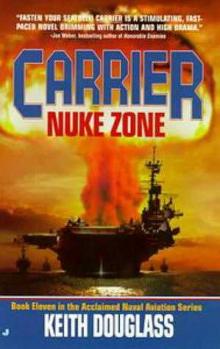 Nuke Zone c-11
Nuke Zone c-11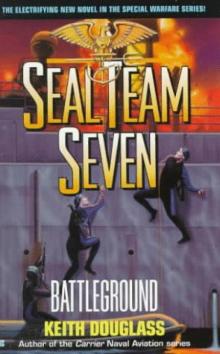 Seal Team Seven 6 - Battleground
Seal Team Seven 6 - Battleground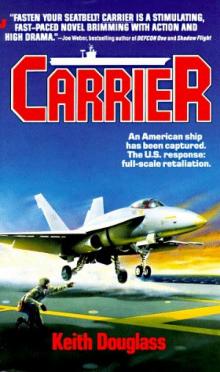 Carrier c-1
Carrier c-1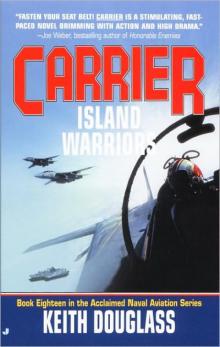 Island Warriors c-18
Island Warriors c-18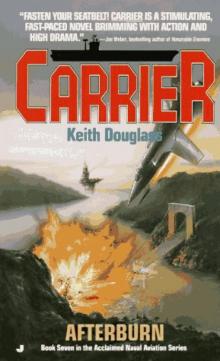 Afterburn c-7
Afterburn c-7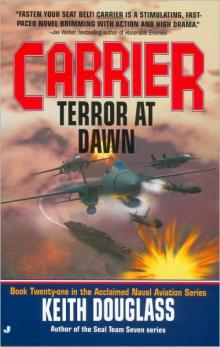 Terror At Dawn c-21
Terror At Dawn c-21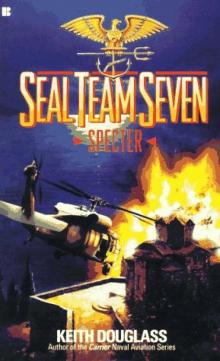 Specter sts-2
Specter sts-2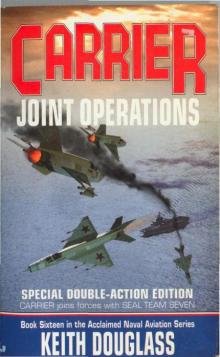 Joint Operations c-16
Joint Operations c-16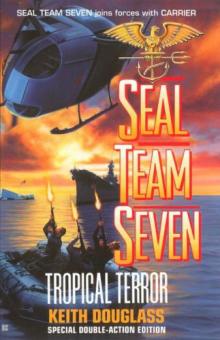 Tropical Terror sts-12
Tropical Terror sts-12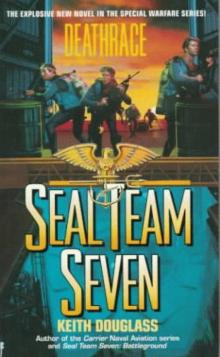 Seal Team Seven 7 - Deathrace
Seal Team Seven 7 - Deathrace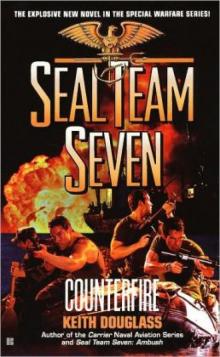 Counterfire sts-16
Counterfire sts-16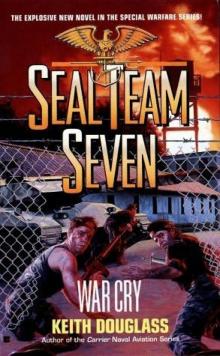 War Cry sts-9
War Cry sts-9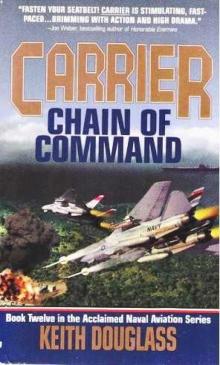 Chain of Command c-12
Chain of Command c-12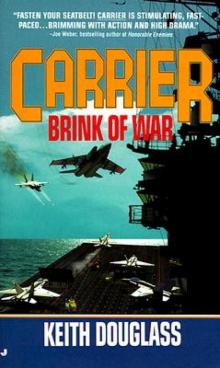 Brink of War c-13
Brink of War c-13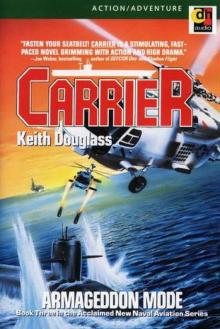 Armageddon Mode c-3
Armageddon Mode c-3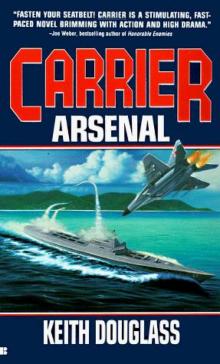 Arsenal c-10
Arsenal c-10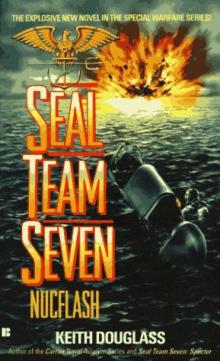 Nucflash sts-3
Nucflash sts-3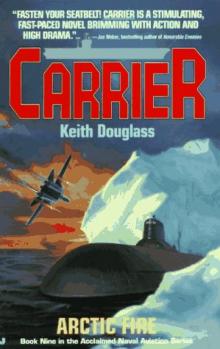 Arctic Fire c-9
Arctic Fire c-9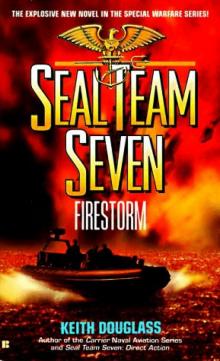 Firestorm sts-5
Firestorm sts-5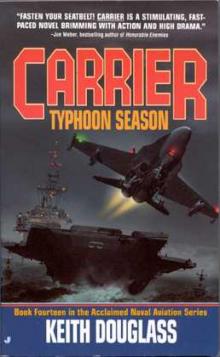 Typhoon Season c-14
Typhoon Season c-14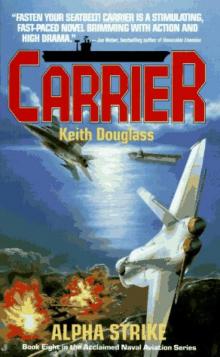 Alpha Strike c-8
Alpha Strike c-8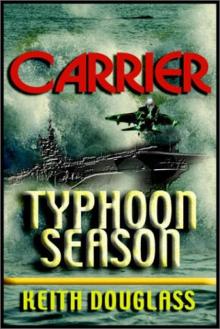 Carrier 14 - TYPHOON SEASON
Carrier 14 - TYPHOON SEASON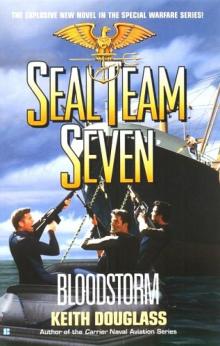 Bloodstorm sts-13
Bloodstorm sts-13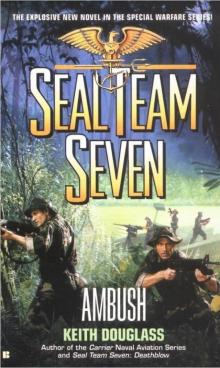 Ambush sts-15
Ambush sts-15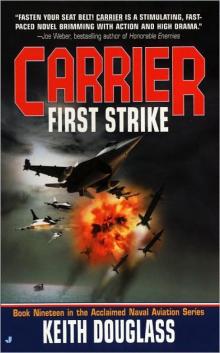 First Strike c-19
First Strike c-19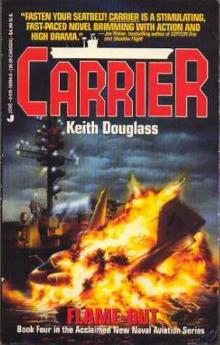 Flame Out c-4
Flame Out c-4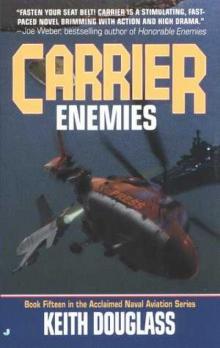 Enemies c-15
Enemies c-15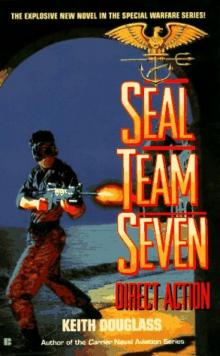 Seal Team Seven 04 - Direct Action
Seal Team Seven 04 - Direct Action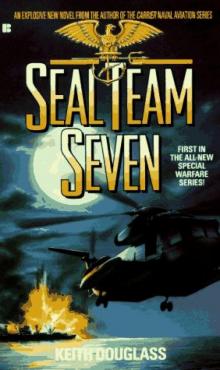 Seal Team Seven 01 - Seal Team Seven
Seal Team Seven 01 - Seal Team Seven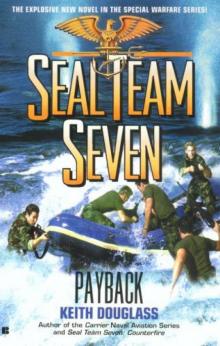 Payback sts-17
Payback sts-17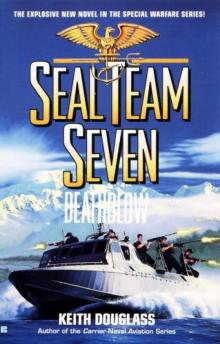 Death Blow sts-14
Death Blow sts-14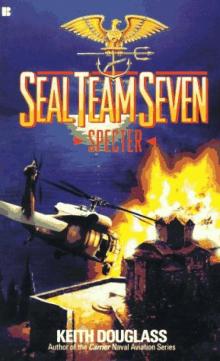 Seal Team Seven 02 - Spector
Seal Team Seven 02 - Spector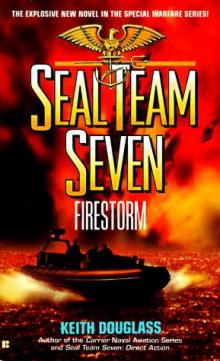 Seal Team Seven 5 - Firestorm
Seal Team Seven 5 - Firestorm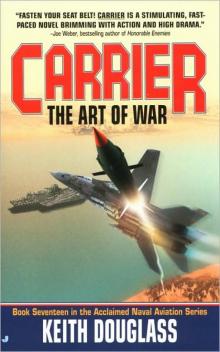 The Art of War c-17
The Art of War c-17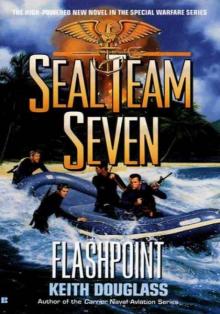 Flashpoint sts-11
Flashpoint sts-11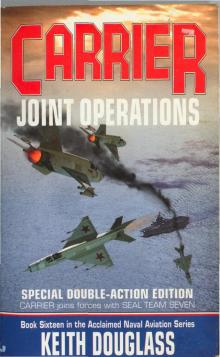 Carrier - Joint Operation Book 16
Carrier - Joint Operation Book 16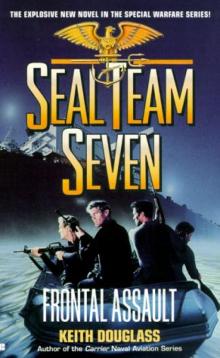 Frontal Assault sts-10
Frontal Assault sts-10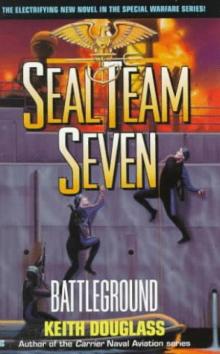 Battleground sts-6
Battleground sts-6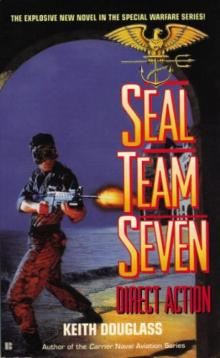 Direct Action sts-4
Direct Action sts-4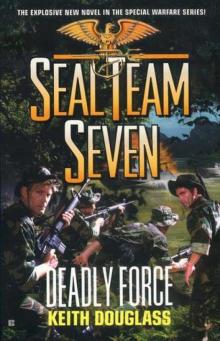 Deadly Force sts-18
Deadly Force sts-18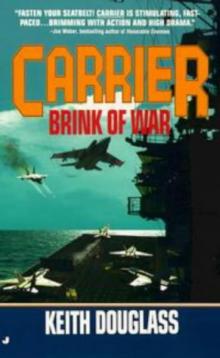 Carrier 13 - Brink of War
Carrier 13 - Brink of War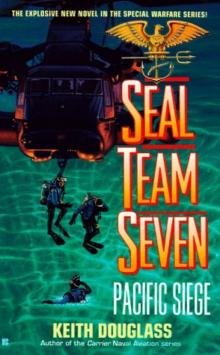 Pacific Siege sts-8
Pacific Siege sts-8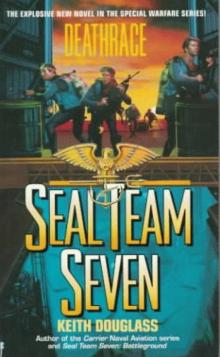 Deathrace sts-7
Deathrace sts-7